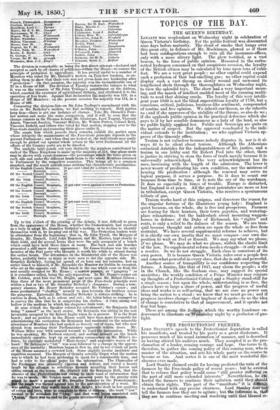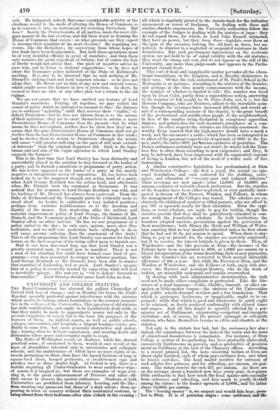tah PROTECTIONIST PREMIER.
LORD STANLEY's speech to the Protectionist deputation is called his manifesto, and treated by his party as a great disclosure. It possesses much of his usual animation of manner, and is described as having stirred his auditors much. They accepted it as the pro- clamation of a leader, rousing courage and hope. One turns to it, therefore, to gather the coming policy of this coming man, who is master of the situation, and sets his whole party on the course to become so too. And certes it is one of the most wonderful dill closures ever made.
Lord Stanley claimed credit for having predicted the vain of the farmers by the Free-trade policy of recent years ; bat he avowed that to retrace that policy would cause "still greater suffering on the part of still more extended interests." Nevertheless, he abli horted the farmers to continue their agitation until they should obtain their rights. This part of the " manifesto " it is difficult to understand with any precise clearness. Lord Stanley does not tell the farmers how they are to agitate; but the inference is, that they are to continue meeting and resolving until that blessed re-
suit. He intimated, indeed, that some 'considerable activity at the elections would be the mode of altering the House of Commons so as to convert it into an instrument for restoring Protection. But how ? Surely the Protectionists, of all parties, made the most dili- gent muster at the last election, and did their worst in framing the House of Commons that exists : on what grounds can they expect to increase their numbers at the next election? By regaining wa- verers, like the Berkeleys ; by converting those whose hopes of free trade have been disappointed. But both these operations must be of very doubtful efficacy in point of numbers ; and then there only remains the great expedient of bribery, but of course the heir of berby would not advise that. One pieee of negative advice he gave was, not to listen to disloyal suggestions : so he does not adopt the Yeomanry policy indicated at the Duke of Richmond's meeting. It is also to be observed that he said nothing of Mr. Disraeli's sinking-fund and local taxation scheme : so he does not adopt that. He threw out no hint of any new and onward course, which might serve the farmers in lieu of protection. In short, he seemed to have no idea of any other plan but a return to the old regime.
We are not aware that we have omitted any feature of Lord Stanley's manifesto. Putting all together, we may collect the course of policy which he indicated to amount to this : the farmers are to continue " agitating " until they recover their "rights," vi- delicet Protection—but he does not inform them as to the nature of their agitation ; they are to exert themselves to return a more Protectionist House of Commons than the present—but by what means he does not explain, neither does he show how they are to secure that the pure Protectionist House of Commons shall not go further than the last Protectionist House of Commons in free trade ; and he invites them to return to Protection—though the return will cause "still greater suffering on the part of still more extend- ed interests" than. the original departure did. Such is the lugu- brious end and aim of the vague agitation to which Lord Stanley counsels the farmers !
This is the first time that Lord Stanley has been distinctly and unavoidably placed in the position to step forward as the leader of
a party, and to furnish a manifesto or pr of party action. He has before appeared as the leader programme in the merely negative or antagonistic action of opposition. He has before been looked up to as the supposed though not acting head of a party, when lord George Bentinck was the acting head, and afterwards when. Mr. Disraeli took the command as lieutenant It was noticed that his response to Lord George Bentinck was cold, and his backing of Mr. Disraeli has always been equivocal. From the Buie of Richmond and the Yeomanry party he evidently seeks to stand aloof. As leader, he cultivates a very isolated position ; perhaps from extreme fastidiousness as to the decorum and dignity of the means. But, neglecting alike the railway and material improvement policy of Lord George, the finance of Mr. Disraeli, and the Yeomanry policy of the Duke of Richmond, Lord Stanley offers no other instead. He has no new programme of a policy suited to the day ; he only says, agitate, meet, elect Pro- tectionists, and we will vote protection back—although to do so will cause greater suffering than the enactment of free trade ! This is all the programme that Lord Stanley can muster for his fol- lowers on the first occasion of his being called upon to furnish one.
Had it not been discerned long ago that lord. Stanley was a greatly overrated man, it would now be manifest. There is not a man of his standing but could have framed some kind of pro- gramme ; even men accounted to occupy an inferior position, like Lord George Bentinck or Mr. Disraeli, have been able to muster that essential of leadership, bad or good. Lord Stanley's meagre hint of a policy is avowedly tainted by suggesting what will lead to inevitable misery. His war-cry is, "On to defeat ! forward to Roncesvalles ! " Lord Stanley should cause Lord John no fear.



























 Previous page
Previous page